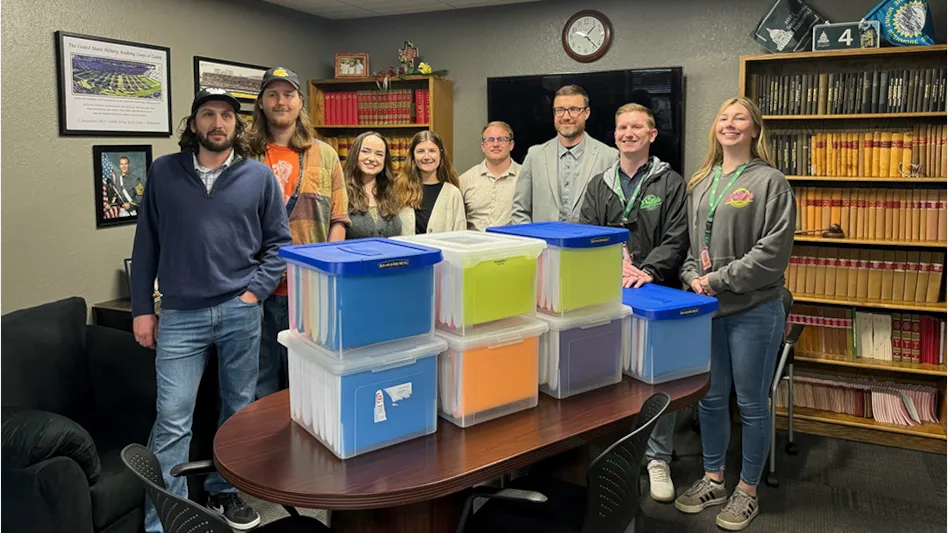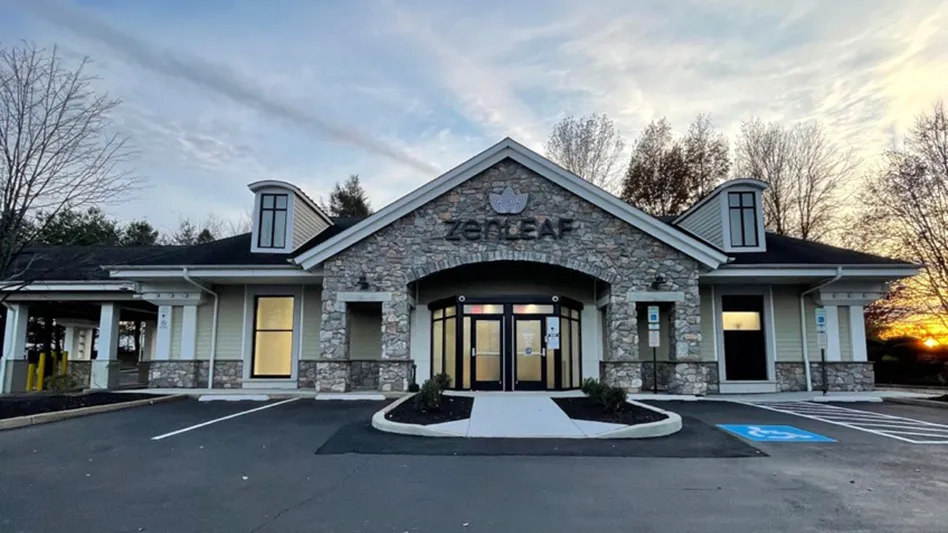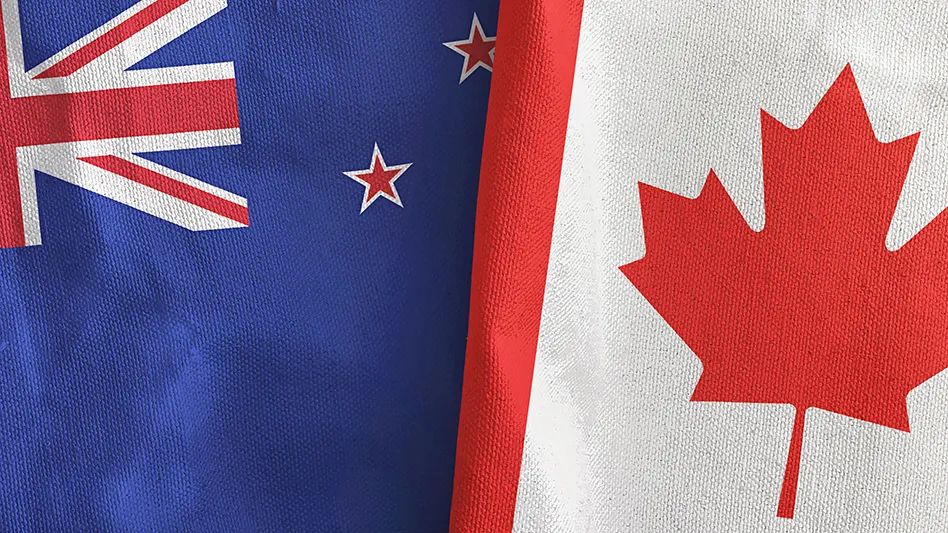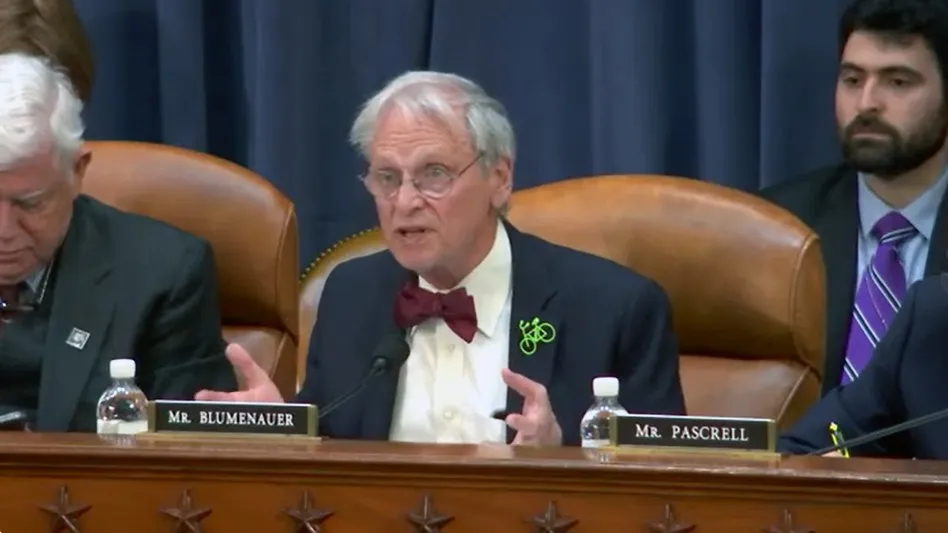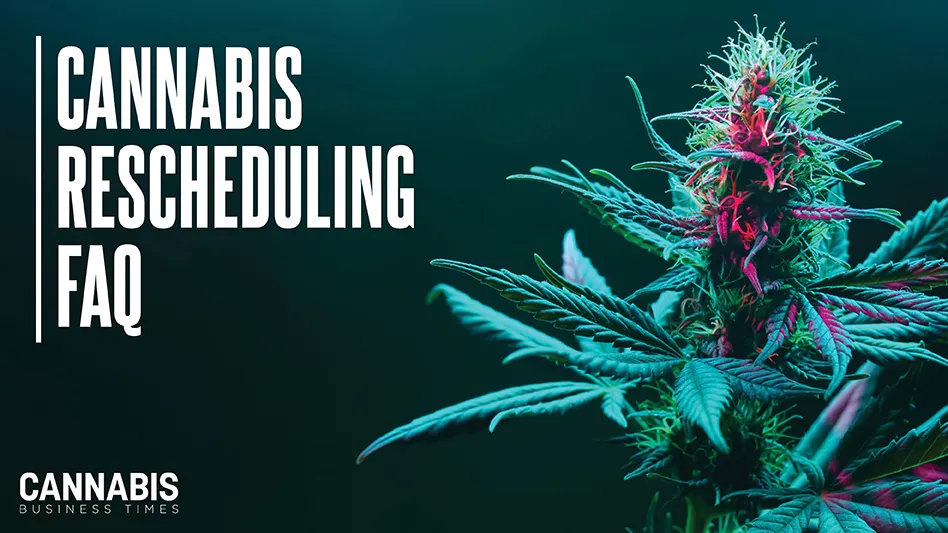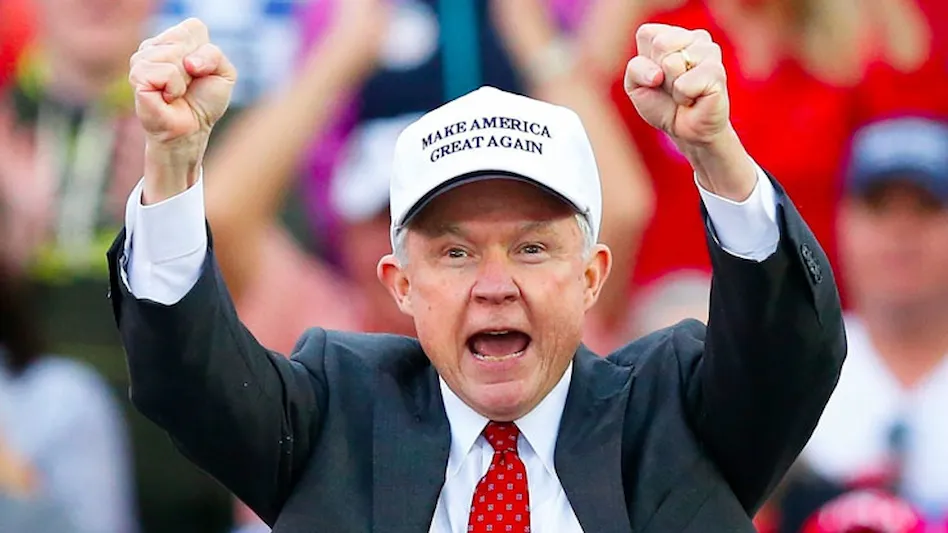
Attorney General Jeff Sessions announced Jan. 4 the end of the federal policy outlined in the Cole Memo and the Department of Justice (DOJ) memos that protected state legal cannabis businesses and banks that do business with them, instead leaving it up to U.S. Attorneys to decide whether to prosecute those groups.
“The Department of Justice today issued a memo on federal marijuana enforcement policy announcing a return to the rule of law and the rescission of previous guidance documents. Since the passage of the Controlled Substances Act (CSA) in 1970, Congress has generally prohibited the cultivation, distribution, and possession of marijuana,” the DOJ said in a press release.
"It is the mission of the Department of Justice to enforce the laws of the United States, and the previous issuance of guidance undermines the rule of law and the ability of our local, state, tribal, and federal law enforcement partners to carry out this mission," said Sessions in a statement. "Therefore, today's memo on federal marijuana enforcement simply directs all U.S. Attorneys to use previously established prosecutorial principles that provide them all the necessary tools to disrupt criminal organizations, tackle the growing drug crisis, and thwart violent crime across our country."
The news quickly drew ire from multiple sources across the country, from cannabis industry officials to politicians spanning the political spectrum.
“Attorney General Sessions has decided to use the power of the federal government to attack the ability of states to decide their own laws,” said Marijuana Policy Project (MPP) Interim Executive Director Matt Schweich in a statement. “This decision may very well lead to federal agents raiding licensed, regulated, and tax-paying businesses—these businesses are employing thousands of Americans and generating hundreds of millions of dollars in tax revenue for public services including substance abuse treatment programs and new school construction.”
RELATED: U.S. to End Policy That Let Legal Marijuana Flourish
NORML Executive Directive Erik Altieri also had harsh words for the AG, saying, "This move by the Attorney General will prove not just to be a disaster from a policy perspective, but from a political one. The American people will not just sit idly by while he upends all the progress that has been made in dialing back the mass incarceration fueled by marijuana arrests and destabilizes an industry that is now responsible for over 150,000 jobs. Ending our disgraceful war on marijuana is the will of the people and the Trump Administration can expect severe backlash for opposing it."
White House Press Secretary Sarah Huckabee Sanders fielded a question during Thursday’s press conference on whether the President believes marijuana legalization is a state issue, and her reply seemed to dismiss President Donald Trump’s comments from the campaign.
“The president believes in enforcing federal law … and that is regardless of what the topic is,” Sanders told the White House press corps.
Brian Vincente, founding partner at cannabis law firm Vicente Sederberg, said the decision leaves the cannabis industry in a state of confusion. “Starting in 2009, … the federal government would issue these policy statements and say, ‘OK, we’re not interested in coming after medical marijuana; we’re not interested in coming after recreational marijuana as long as people are following these eight priorities,’ and things of that nature. All of that has gone away.”
Sessions’ decision most directly impacts states that have enacted recreational (or adult-use) cannabis laws. The Rohrabacher-Blumenauer amendment, which prevents the Justice Department from spending public funds on prosecuting state legal medical marijuana businesses, is still in effect until Jan. 19, when the federal budget expires. If that amendment is not kept in the new budget bill, U.S. Attorneys will be able to prosecute any cannabis businesses as they see fit.
In a tweet, Colorado Senator Cory Gardner accused Sessions of lying to him prior to the AG’s confirmation. “This reported action directly contradicts what Attorney General Sessions told me prior to his confirmation. With no prior notice to Congress, the Justice Department has trampled on the will of the voters in CO and other states,” the senator tweeted. The Republican senator followed that up with a statement on the senate floor that he “will be putting today a hold on every single nomination from the Dept. of Justice until Attorney General Jeff Sessions lives up to the commitment that he made to me.”
I am prepared to take all steps necessary, including holding DOJ nominees, until the Attorney General lives up to the commitment he made to me prior to his confirmation.
— Cory Gardner (@SenCoryGardner) January 4, 2018
The announcement comes the day after Sessions appointed 17 interim U.S. Attorneys. Appointees in Colorado, Rhode Island, New York, New Jersey, Nevada and Michigan—all of which have established cannabis markets—have experience either prosecuting drug offenders or with money laundering cases.
Colorado U.S. Attorney Robert Troyer, one of Sessions’ interim appointees, said in a statement that the Colorado branch “has already been guided by these principles in marijuana prosecutions—focusing in particular on identifying and prosecuting those who create the greatest safety threats to our communities around the state. We will, consistent with the Attorney General’s latest guidance, continue to take this approach in all of our work with our law enforcement partners throughout Colorado.”
“We must stop Jeff Sessions' backwards actions. There is now great urgency to pass the Marijuana Justice Act to legalize marijuana on the federal level,” said Sen. Cory Booker (D-NJ) in a tweet. Booker is the sponsor of the Marijuana Justice Act, which would remove cannabis’ Schedule I classification and create a fund to reinvest cannabis revenue into communities most impacted by the War on Drugs.
We must stop Jeff Sessions' backwards actions. There is now great urgency to pass the Marijuana Justice Act to legalize marijuana on the federal level.
— Sen. Cory Booker (@SenBooker) January 4, 2018
Now is the time. Call your Senator. https://t.co/Cr8FZjITWI pic.twitter.com/9OMTz3VMjN
Sen. Kirsten Gillibrand (D-NY), a co-sponsor of the CARERS Act (another bill presented by Sen. Booker that would recognize that marijuana has accepted medical use and that it is the states’ responsibility to set medical marijuana policy) released a statement accusing Sessions of attacking sick patients treating their conditions with marijuana.
“Attorney General Sessions' reported decision is a direct attack on patients,” Gillibrand said. “This is about public health, and it's about reforming our broken criminal justice system that throws too many minorities in prison for completely nonviolent offenses. I urge my colleagues to join me in fighting this shortsighted decision and supporting my broadly bipartisan bill, the CARERS Act, to keep the federal government out of the way when doctors and patients decide that medical marijuana is the best treatment for them.”
Similarly, Senator Rand Paul (R-KY) has stated, "I continue to believe that this is a states’ rights issue, and the federal government has better things to focus on."
The decision also has drawn criticism from local officials who see the direct impact cannabis businesses have in their communities. Sal Pace, a Pueblo, Colo., county commissioner and former Colorado House Democratic Leader, said any move to reverse cannabis legalization enacted by citizens across the country “will be opposed vigorously by a bipartisan national coalition of local elected officials. A reversal of the sovereign voice of the American public is an assault on the intellect of Americans, an assault on the fundamental tenants of democracy, and an attack on the Constitutional guarantee of states’ rights.”
Pace also held President Trump accountable for his AG’s actions, as Pueblo county favored Trump in the 2016 elections. “The same 165,000 residents who elected me voted for Donald Trump and voted in favor of the legalization of marijuana. The citizens from this Trump-backing county do not want this economic engine shut down, sending thousands of people to the unemployment line and costing our County government millions in tax revenues.”
The cannabis industry has not been deflated by the disappointing news. Jaime Lewis, chairwoman of the National Cannabis Industry Association (NCIA), said in a statement that this policy “does not mean a wholesale dismantling of the regulated markets that now exist in over half of U.S. states. Now more than ever, it is of the utmost importance that we continue to support our colleagues and the organizations that are fighting for a legitimate, regulated marijuana industry and safe, legal access to cannabis medicine.”
It remains uncertain whether states planning on enacting new cannabis programs in 2018 will be chilled by the AG’s announcement, and industry experts are split as to the impact this decision will have on state plans.
“This news from the Department of Justice is disturbing, especially in light of the fact that 73 percent of voters oppose federal interference with state cannabis laws,” NCIA Executive Director Aaron Smith said in a statement. “But, the rescinding of this memo does not necessarily mean that any major change in enforcement policy is on the horizon. This has been, and still will be, a matter of prosecutorial discretion.”
Brian Vicente said the biggest impediment to the growth of the industry won’t be states shying away from passing cannabis legislation, but rather investors fleeing the market. “I do think this will lead to some problems in terms of investment into this industry. I think some traditional institutional investors will be a little spooked by the fact that this protection has gone away. I do think there’s an issue with banking, as well,” Vicente said.
Without the guidance from the DOJ memos, banks “will be more concerned about working with this industry because the DOJ just rescinded their guidance saying it wasn’t a problem for them. That’s not only a business problem, that’s a public safety issue at that point if we have banks pulling out on what’s a $30 billion industry in our country,” Vicente said.
However, if the U.S. Attorneys, overwhelmingly Sessions appointees, decide to prosecute cannabis businesses, the impact on the industry’s growth would be immediate according to NORML Political Director Justin Strekal, who added that it would be even more damaging if the federal government did so in spite of the Rohrabacher-Blumenauer Amendment.
Update: 1/4/18 6:06 p.m. EST: The Alaska Marijuana Industry Association (AMIA) released a statement late on Thursday calling the DOJ decision a "slap in the face to the American voters and the residents of Alaska."
Alaska's Attorney General, Jahna Lindemuth, said she will uphold state laws and continue to stand up for Alaska's medical and adult-use cannabis markets despite the DOJ's policy shift, according to the Fairbanks Daily News-Miner.
Update: 1/4/18 7:42 p.m. EST: The California Bureau of Cannabis Control Chief Lori Ajax released in a statement, "The administration is conferring with the California Attorney General and other states in response to this action. We expect the federal government to respect the rights of states and the votes of millions of people across America and if they won't, Congress should act. Regardless, we’ll continue to move forward with the state's regulatory processes covering both medicinal and adult-use cannabis consistent with the will of California’s voters, while defending our state's laws to the fullest extent.”
Update: 1/5/18 3:35 p.m. EST: Native nations are also impacted by the DOJ's rescinding of Obama-era policies. On Oct. 28, 2014, the DOJ released a memo indicating that Native Nations tribes could participate in the cannabis industry as long as they followed the guidelines outlined in the Cole Memo. With the Cole Memo policy rescinded, that memo has been voided.
Jacob Taylor of the Pontiac Group, an organization focused on developing business relationships between private companies and native nations bands, said to Cannabis Business Times that while federal law enforcement agencies have jurisdiction over tribal land, this decision in particular could mean that the DOJ "is going to cherry-pick what they close down and enforce. … That usually happens more against minorities and small players, and native nations are usually at the forefront of that."
Update: 1/11/18 9:40 a.m. EST: Stephen Hudak, a FinCEN spokesman, said in a statement that the agency’s guidance “remains in place,” despite the Justice Department’s actions.
Top image via https://gutierrez.house.gov
Latest from Cannabis Business Times
- Verano Opens MÜV Haines City, Company’s 75th Florida Dispensary
- Ascend Wellness Holdings Reports $142.4M Net Revenue for Q1 2024
- Trulieve Reports $298M in Revenue for 1st Quarter 2024
- SNDL Reports 1st Quarter 2024 Financial, Operational Results
- Leading Cannabis Brand STIIIZY Expands Retail Presence With Fresno Location Opening Saturday, May 11
- The Cannabist Co. Reports 1st Quarter 2024 Results
- Green Thumb Reports $276M Revenue for 1st Quarter 2024
- Colorado Legislature Gives Final Approval to Measure Aimed at Streamlining Marijuana Regulations
